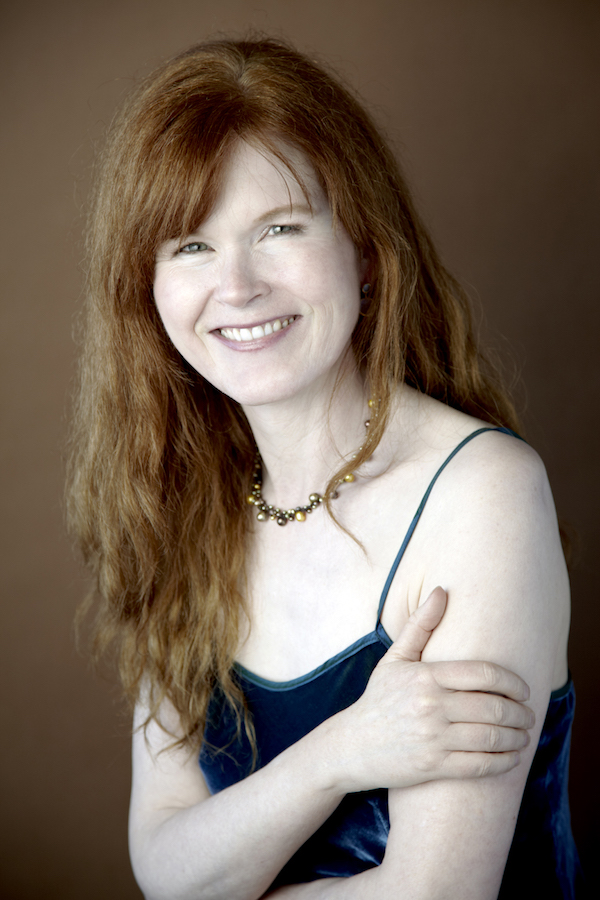Bay Area icon Sarah Cahill, a pianist who specializes in contemporary music, gave a recital and received a national prize this past Sunday, July 22, at Old First Church in San Francisco.
The American Composers Forum Award was a welcome recognition, as Cahill has championed many living composers and even commissioned their works. Alongside that, she is a brilliant musician who has recorded numerous compositions for the piano, writes and produces a weekly radio show on new music, and produces ambitious projects and festivals.
John Neuchterlein, President of the Minnesota-based American Composers Forum, said of Cahill, “Sarah understands what new composers are trying to do. And that’s unusual. Beethoven’s works were played really poorly in his day, because musicians didn’t understand the new forms. In this concert all of the works were either dedicated to her or commissioned by her.”
He presented a heavy plaque to audience cheers, and then continued. “Since we are based in Minnesota, I have a surprise for you. We are also the home state of General Mills, the maker of Wheaties, and…” With a flourish he pulled out a box of the cereal with her face on it as an American Champion, and handed it to her.

Readers of the Piedmont Post may recall my article last month about the Garden of Memory, a solstice celebration at Oakland’s Chapel of the Chimes. Cahill originally founded that midsummer festival in 1996 and continues to perform in it each year, along with over fifty other performers or groups. The busy Cahill also produces “Revolutions per Minute,” a weekly radio show on KALW filled with contemporary music and interviews with composers.
Sunday afternoon’s concert was meant to be a celebration of her long years interpreting and presenting new works, her filter on life at the edge. She began with a selection from Steppe Music by Meredith Monk, a work that she had invited from the composer. There were high doubled notes, a sharp refrain between the slow arpeggios, creating a tension between a sharp immediacy and a hypnotic meditation. The harmonies were bright and satisfying, and, played on this amazing Steinway in the vaulted space of Old First, one could hear harmonics far above and below the note being played, a cloud of sound that painted a celestial vault.
“In Steppe Music I have tried to write for piano the way I would for the voice,” wrote Monk for the program notes (and each composer wrote their notes). “a kind of aural landscape or topography.” Cahill gave it a lingering simplicity to posit that voice and a clarity to match its long view.
In Ingram Marshall’s Authentic Presence, Cahill made bright puddles of notes out of Eastern scales, then undercut them with pounding repetitions, a sense of concrete and busy city streets. And then the quiet arpeggios returned, the life on the edges of structure, building into the trill and blur of fast spinning colors.
China Gates was a lighter beauty, silvered and hopeful, written for Sarah Cahill by John Adams when she was just 17 years old and had entered the San Francisco Conservatory of Music. “It oscillates between two modal worlds,” wrote Adams, “only it does so with extreme delicacy.” This early work took a quiet patter of cool notes and slowly cycled them into and out of arrangements that were almost tactile, flowing and rain-like.
“I asked Pauline Oliveros to write a piece that was a notated score and she came up with Quintuplets Play Pen and she said it was the first time in years she had written a notated score. The ‘Play Pen’ is the keyboard and the ‘Quintuplets’ are the fingers.”
This was quixotic and difficult, a work that stammered its way through a puzzle and ended abruptly. But it was a deeply satisfying hypothesis.
She followed with the exotic RCSC by Annea Lockwood, with Cahill hunched over the guts of the piano plucking and “zithering,” and then Shade Studies by Samuel Adams, a sought-after young composer. Dedicated to Sarah Cahill and Terry Riley, this was based on an impromptu that Riley wrote about a decade ago. Adams was present in the audience and took the mike to describe that work. “Terry was playing this at a birthday party and I decided I wanted to lie down under the piano. It was his usual Ouroboros, with Carnatic scales and jazz and rag and then there was a delicate part in the center. Shade is taken from that delicate part.”
This was luminous music, played with utter concentration. We could see Cahill’s hands, springing after each note as if she pulled the notes up out of the air. There were long middle register notes that tolled and sustained (the middle pedal) while other notes built and faded around it.
That prayer-like work was followed by Phil Kline’s powerful The Long Winter, written after the 9/11 World Trade Center tragedy. “Crash” was rage and dissonance, while “Embers” was a quieter grief, spectral notes with a measured tread that never quite resolved into passages. This was deeply moving stuff.
She closed with Terry Riley’s Be Kind to One Another (Rag), written for her 2015 “A Sweeter Music” commissioning project. “The title,” wrote Riley, “is taken from something Alice Walker said immediately after 9/11 happened: ‘We must learn to be kind to one another now.’ My new composition is a statement for peace, and as such it does not aim for dramatic content, but strives instead to enforce a feeling of balanced equilibrium and compassion.”
This music was bittersweet and lilting, dreamy and virtuosic and I was reminded of the brooding piano score in “La La Land.” But then Cahill stepped into a rag, earthy and joyous, and one could imagine the peace at the end of that pain. It was lovely music, lovingly played, and the audience stood to applaud.
—Adam Broner
Photo top of Sarah Cahill, by Christine Alcino.
